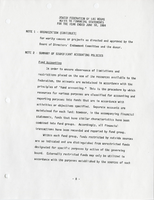Search the Special Collections and Archives Portal
Search Results

Meeting minutes for Consolidated Student Senate, University of Nevada, Las Vegas, September 26, 1978
Date
Archival Collection
Description
Text

Transcript of interview with Justice Michael Cherry by Barbara Tabach, September 19, 2014
Date
Archival Collection
Description
Interview with Justice Michael Cherry by Barbara Tabach on September 19, 2014. In this interview, Justice Cherry talks about how he came to Las Vegas and his work as a public defender and as a lawyer in private practice. He also discusses his involvement with Jewish organizations in various capacities, and his involvement with high-profile cases such as the MGM Grand and Las Vegas Hilton fires, earning him the nickname "master of disaster."
Justice Michael Cherry was born in St. Louis, Missouri, and went on to spend his childhood in the Jewish neighborhood of University City. He attended University of Missouri and became a leader in his fraternity, Alpha Epsilon Pi, and a committed ROTC cadet. By the time Justice Cherry graduated from Missouri and was heading to Washington University School of Law, he was a second lieutenant; halfway through law school, he was promoted to first lieutenant. It was also during law school that he married his college sweetheart, Rachel Wolfson. When a bad back prevented him from becoming an active air force officer, he and his wife decided to follow his mother to Las Vegas. Justice Cherry worked both as a law clerk with the Public Defender's Office as well as a security guard at Wonder World when he first moved to the city. After passing the Nevada bar, Cherry took at position with the Public Defender's Office, and later went into private practice as a successful criminal defense attorney. Cherry was elected as district judge in 1998 and 2002. In 2006, he won his campaign for state Supreme Court justice. Justice Cherry was reelected to office in 2012 for another four-year term. He is currently the highest-positioned Jewish official in the state of Nevada. Throughout his years in Las Vegas, Justice Cherry has been an extremely active and influential member of the Jewish community and served as chairman of the Anti-Defamation League and is active in the Jewish Federation. Justice Cherry attributes his commitment to service to his mother. In addition to his service to the Jewish community, he has been active in numerous other service organizations, including March of Dimes, Olive Crest, Adoption Exchange and American Cancer Society.
Text
Wolff, Walter P., 1928-2016
http://www.ladailypost.com/content/obituary-walter-p-wolff-dec-29-2016
copied from resouce above
Person
Blue Diamond Mine Corporate Records
Identifier
Abstract
The Blue Diamond Mine Corporate Records (1918-2005) consist of operational and organization records of the gypsum mining and milling operations located in southwest Clark County, Nevada. Materials include operational records related to individual boring sites at the mine; milling operations and statistics; and equipment operations and statistics, including maps, field notebooks, and photographs. There are also daily, weekly, and monthly organizational records related to employee work schedules and safety reports for the mining operations, including accident reports and a safety education training program.
Archival Collection
UNLV Libraries Collection of Boyd Gaming Promotional Materials and Reports
Identifier
Abstract
The UNLV Libraries Collection of Boyd Gaming Promotional Materials and Reports includes annual reports, clippings, financial reports, a press kit, press releases, and promotional materials for Boyd Gaming Corporation in Las Vegas, Nevada, dating from 1986-2009.
Archival Collection
Harry Hayden Whiteley Architectural Records
Identifier
Abstract
The Harry Hayden Whiteley Architectural Records are comprised of architectural records (1931-1970) created and/or maintained by the American architect Harry Hayden Whiteley and/or his architectural firm, known as Harry Hayden Whiteley and Associates. This collection includes 30.21 linear feet of materials including 45 items from over 30 projects. The collection focuses on his work in the Las Vegas and Reno, Nevada areas. The materials feature both architectural drawings and project files. Architectural drawings include pencil and ink on tracing paper preliminary sketches and mounted artist’s renderings used for presentations and promotional materials. Project files include project correspondence, photographs, and structural calculations. The drawings also contain work from the architect Paul Revere Williams. The collection includes architectural drawings for hotels, shopping plazas, residential developments, and office buildings.
Archival Collection
Baneberry Nuclear Test Trial Records
Identifier
Abstract
The Baneberry Nuclear Test Trial Records (1969-1989) contain documents of a federal court case regarding a 1970 Nevada Test Site nuclear test and the resultant radioactive cloud which may have exposed and subsequently injured the test site workers. The consolidated suits, William Nunamaker vs. the United States and Harley Roberts vs. the United States, came to trial January 1979, in Federal District Court, Las Vegas, U.S. District Judge Roger Foley presiding. The materials in the collection consist of court documents, such as transcripts of the trial, briefs, findings and statements, an appeal, orders, defense and plaintiff exhibits, and indices to the exhibits and witnesses as well as a glossary of terms.
Archival Collection
Bill Hughes Photographs
Identifier
Abstract
The Bill Hughes Photographs (approximately 1980-2012) contains negatives, slides, prints, proofs, and born digital images created by local photographer and photojournalist Bill Hughes for publications including Las Vegas CityLife, Las Vegas Business Press, Las Vegas Weekly, as well as commercial clients. A portion of prints in the collection consist of modeling photographs Hughes took as part of his business. The digital images represent a variety of clients, and feature local bands, DJs, and performers in nightclubs and bars on the Strip and downtown Las Vegas. Also included in digital files are portraits, artistic photographs and self-portraits, and material used for Las Vegas Weekly, CityLife, and Business Press.
Archival Collection

